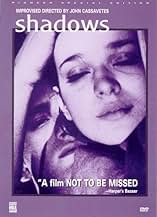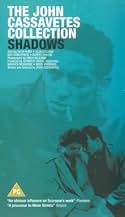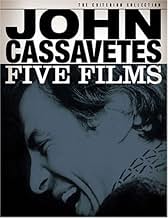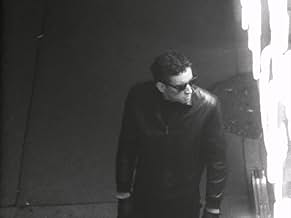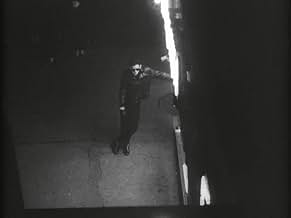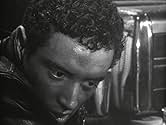Shadows
- 1958
- Tous publics
- 1h 21min
NOTE IMDb
7,2/10
13 k
MA NOTE
Dans le New York des années 50, le film d'improvisation jazz de Cassavetes explore les amitiés et les relations interraciales au sein de la Beat Generation.Dans le New York des années 50, le film d'improvisation jazz de Cassavetes explore les amitiés et les relations interraciales au sein de la Beat Generation.Dans le New York des années 50, le film d'improvisation jazz de Cassavetes explore les amitiés et les relations interraciales au sein de la Beat Generation.
- Réalisation
- Scénario
- Casting principal
- Nomination aux 4 BAFTA Awards
- 2 victoires et 5 nominations au total
David Jones
- Davey
- (as Davey Jones)
Avis à la une
Shot on a minimal budget of $40,000 with a skeleton six person crew, SHADOWS offers an observation of the tensions and lives of three siblings in an African-American family in which two of the three siblings, Ben (Ben Carruthers) and Lelia (Lelia Goldoni), are light-skinned and able to pass for white. Cassavetes demanded that the actors retain their real names to reflect the actual conflicts within the group but saw the film as being concerned with human problems as opposed imply to racial ones. Cassavetes shot the film in ten minute takes and jagged editing, a reaction against 'seamless' Hollywood production values. Cassavetes main inspiration - at least in the cinematic style the film was shot - were the Italian neo-realists whilst also professing admiration for Welles' pioneering spirit. The use of amateurs and improvisation might resemble some of the Italian neo-realist directors, but with his bebop score by Charles Mingus ans Shafi Hadi, the film feels very different, very American, unlike anything made before really.
The song with the feathered girls, "I feel like a lolly-pop" (or something) feels like light years back to me, ancient history. But no matter how dated it might look, it still makes a delightful time capsule of late Fifties New York today. I think it's this is one of the first films made aspiring filmmakers realize they could shoot an independent film, without Hollywood, improvised and without a real budget. Seymour Cassel, who acted and was involved in SHADOWS, claims it was Jules Dassin's THE NAKED CITY (1948) that was the first and inspired them all, but I think this was the one that really opened the eyes of aspiring independent American filmmakers.
Camera Obscura --- 8/10
The song with the feathered girls, "I feel like a lolly-pop" (or something) feels like light years back to me, ancient history. But no matter how dated it might look, it still makes a delightful time capsule of late Fifties New York today. I think it's this is one of the first films made aspiring filmmakers realize they could shoot an independent film, without Hollywood, improvised and without a real budget. Seymour Cassel, who acted and was involved in SHADOWS, claims it was Jules Dassin's THE NAKED CITY (1948) that was the first and inspired them all, but I think this was the one that really opened the eyes of aspiring independent American filmmakers.
Camera Obscura --- 8/10
1959 was a landmark in the world of film. Several great directors of the classic era were releasing career capping classics that ranked among their best. Just a look at the titles is instructive, Hitchcock's North By Northwest, Billy Wilder's Some Like It Hot, Howard Hawks' Rio Bravo, Douglas Sirk's Imitation of Life. Add a couple from the previous year, Orson Welles' Touch of Evil, Hitch's Vertigo, and Nick Ray's Wind Across the Everglades, and you've got a pretty good summing up of what was possible within the classic Hollywood style.
At the same time, two films appeared that hinted at a whole new way of making films. One was Jean-Luc Godard's Breathless, the other was John Cassavetes Shadows. The two films had certain things in common, largely improvised acting by non stars, handheld cameras, low budgets, and a certain youthful, jazzy swagger. In certain ways, though, they couldn't be farther apart. Godard was still a believer in the director as arbiter of style. He knew more about film than most Hollywood producers, and Breathless was filled with the iconography of the classic crime film. Cassavetes, on the other hand, was an actor, and a refugee from New York's underground theater scene. His first film shows him little impressed with the cinema, and a big believer in actors. Godard's film constantly references it's own artifice, whereas Shadows aims for a certain kind of naturalism.
It doesn't reach it, mainly because naturalism is a myth, particularly in cinema. But it feels powerful, kinetic but lilting like the cool jazz on the score, certainly the main inspiration for the filmmaking style on display here. It ultimately doesn't hold together, mainly because Cassavetes' actors here are amateurish beatniks, where Cassavetes style requires strong, imaginative actors. His later work with Gena Rowlands, Ben Gazarra, and Peter Falk blows this out of the water. Due to the director's technical inexperience, some bits of dialogue had to be redubbed later, which defeats the freshness of the improvisation. Still it's fascinating to watch, both for the great moments (like the scene where Leila Goldoni talks about her dissapointment with losing her virginity) and to watch a groundbreaking artist finding his way.
At the same time, two films appeared that hinted at a whole new way of making films. One was Jean-Luc Godard's Breathless, the other was John Cassavetes Shadows. The two films had certain things in common, largely improvised acting by non stars, handheld cameras, low budgets, and a certain youthful, jazzy swagger. In certain ways, though, they couldn't be farther apart. Godard was still a believer in the director as arbiter of style. He knew more about film than most Hollywood producers, and Breathless was filled with the iconography of the classic crime film. Cassavetes, on the other hand, was an actor, and a refugee from New York's underground theater scene. His first film shows him little impressed with the cinema, and a big believer in actors. Godard's film constantly references it's own artifice, whereas Shadows aims for a certain kind of naturalism.
It doesn't reach it, mainly because naturalism is a myth, particularly in cinema. But it feels powerful, kinetic but lilting like the cool jazz on the score, certainly the main inspiration for the filmmaking style on display here. It ultimately doesn't hold together, mainly because Cassavetes' actors here are amateurish beatniks, where Cassavetes style requires strong, imaginative actors. His later work with Gena Rowlands, Ben Gazarra, and Peter Falk blows this out of the water. Due to the director's technical inexperience, some bits of dialogue had to be redubbed later, which defeats the freshness of the improvisation. Still it's fascinating to watch, both for the great moments (like the scene where Leila Goldoni talks about her dissapointment with losing her virginity) and to watch a groundbreaking artist finding his way.
What is there to say about an anti-establishment film that was produced in a time of such colourless void, social indifference and authoritarian contentment. Cassevettes first major independent film was not an instant box office success and still has not received the critical attention it deserves. I draw comparisons to this wave of American independent projects consisting of such 'Beat' filmmakers as Robert Frank and Harry Smith with the burgeoning scene emerging in Paris in the late 1950's known as the French new wave.
They discussed poetry and philosophy and vulnerability at a time when the rest of the culture was obsessed with rediscovering American cultural supremacy; even at this stage this peculiar, highly spontaneous brand of filmmaking fought against the establishment of such political lexicons and bigots that held the development of the arts in check in the mid twentieth century.
Cassevettes film examines race relations and portrays man as weak in the face of love because we, as a culture, are blinded by our own race bias and prejudice. The great element to most of Cassevettes work is that his films have almost a reversal minimalist effect; a mental reaction is evoked through subtle character relations, not so much imagery. This is why his work seems to linger because he takes a more intimate approach to defining charcters that rely less heavily on explicit actions and more upon interpretation.
Although my favourite Cassevettes film is 'Husbands', this one is his most important.
They discussed poetry and philosophy and vulnerability at a time when the rest of the culture was obsessed with rediscovering American cultural supremacy; even at this stage this peculiar, highly spontaneous brand of filmmaking fought against the establishment of such political lexicons and bigots that held the development of the arts in check in the mid twentieth century.
Cassevettes film examines race relations and portrays man as weak in the face of love because we, as a culture, are blinded by our own race bias and prejudice. The great element to most of Cassevettes work is that his films have almost a reversal minimalist effect; a mental reaction is evoked through subtle character relations, not so much imagery. This is why his work seems to linger because he takes a more intimate approach to defining charcters that rely less heavily on explicit actions and more upon interpretation.
Although my favourite Cassevettes film is 'Husbands', this one is his most important.
In the end credits of "Shadows", after we read 'directed by John Cassavetes', some white letters on the screen can be seen: "The film you have just seen is improvised", they say. I am always pursuing the fact that words are so important in movies since filmmakers started using them because, basically, there's no film without a screenplay and many other reasons.
Cassavetes pursued the same goal, and he believed in the freedom of words; "Shadows" is the perfect example. It's a film with no real main characters, with no real main plot lines; it's mostly people in different situations, talking. Yes, some of the situations are connected but Cassavetes, apparently always in a rush to get to the talking, uses a fast forward technique when the characters are going somewhere or escaping from someone and are not speaking.
Appearances are everything in this movie. For example, there's a brilliant score, full of jazz influences and a lot of fantastic solos, and there's one character that says he's a jazz musician and plays the trumpet (Ben, all the characters' names are the same names the actors'). However, we never see him play the trumpet or jam with a band; he doesn't even talk about music and just wanders with his friends around the city. They do talk, a lot, and about anything that's in their minds; going from how intelligent each of them are to the hilarious analysis of a sculpture.
"Shadows" is funny in its intellectual references in parts like the one above, because these friends are not cultured. The only important female character in the film (Lelia), though, wants to be an intellectual. But again, she has one very interesting conversation with an older man at a party, about a book she's trying to write, and about how to confront reality; but nothing to do with being intellectual. At that same party, a woman is actually making an intellectual statement, full of complexity, and asks a guy beside her: "Do you agree?". "Yes", he says, but you can tell he doesn't know what she's talking about.
Another character, a singer (Hugh), talks about his glory days in occasions, and we see him perform only once; but no references to the musical industry there. The focus of Cassavetes is the singer's relationship with his manager (Rupert), which most of the time involves chats about trivial stuff and not real 'musical' talks. So the trumpet player's important deal in "Shadows" is the time he spends with his friends; the intellectual wannabe girl's is her way of handling romantic relationships (one of the movie's strong points) and the singer's is the bond with his manager Appearances.
The reason why performances are not important in this movie is simple. Cassavetes needed people who could master improvisation, without mattering if they were actually good. I believe some of them aren't, but they surely know how to improvise in a scene, and you can notice how well they do it. "Shadows" is not about performers; it's about a way of making cinema, based on the magic of conversation; and there you could say that performances mean something.
That's why in every conversation the camera is like a stalker, constantly on the eyes of every character, constantly looking for the expressions that come with natural speech. There's a scene where the trumpet player and his friends are trying to pick up some girls. They are three, so each of them sits beside one girl (the girls are three two) in three different tables. They all talk at the same time and the camera shoots through the table, and sometimes the friends look at each other, while they say whatever they are saying It's natural.
Cassavetes pursued the same goal, and he believed in the freedom of words; "Shadows" is the perfect example. It's a film with no real main characters, with no real main plot lines; it's mostly people in different situations, talking. Yes, some of the situations are connected but Cassavetes, apparently always in a rush to get to the talking, uses a fast forward technique when the characters are going somewhere or escaping from someone and are not speaking.
Appearances are everything in this movie. For example, there's a brilliant score, full of jazz influences and a lot of fantastic solos, and there's one character that says he's a jazz musician and plays the trumpet (Ben, all the characters' names are the same names the actors'). However, we never see him play the trumpet or jam with a band; he doesn't even talk about music and just wanders with his friends around the city. They do talk, a lot, and about anything that's in their minds; going from how intelligent each of them are to the hilarious analysis of a sculpture.
"Shadows" is funny in its intellectual references in parts like the one above, because these friends are not cultured. The only important female character in the film (Lelia), though, wants to be an intellectual. But again, she has one very interesting conversation with an older man at a party, about a book she's trying to write, and about how to confront reality; but nothing to do with being intellectual. At that same party, a woman is actually making an intellectual statement, full of complexity, and asks a guy beside her: "Do you agree?". "Yes", he says, but you can tell he doesn't know what she's talking about.
Another character, a singer (Hugh), talks about his glory days in occasions, and we see him perform only once; but no references to the musical industry there. The focus of Cassavetes is the singer's relationship with his manager (Rupert), which most of the time involves chats about trivial stuff and not real 'musical' talks. So the trumpet player's important deal in "Shadows" is the time he spends with his friends; the intellectual wannabe girl's is her way of handling romantic relationships (one of the movie's strong points) and the singer's is the bond with his manager Appearances.
The reason why performances are not important in this movie is simple. Cassavetes needed people who could master improvisation, without mattering if they were actually good. I believe some of them aren't, but they surely know how to improvise in a scene, and you can notice how well they do it. "Shadows" is not about performers; it's about a way of making cinema, based on the magic of conversation; and there you could say that performances mean something.
That's why in every conversation the camera is like a stalker, constantly on the eyes of every character, constantly looking for the expressions that come with natural speech. There's a scene where the trumpet player and his friends are trying to pick up some girls. They are three, so each of them sits beside one girl (the girls are three two) in three different tables. They all talk at the same time and the camera shoots through the table, and sometimes the friends look at each other, while they say whatever they are saying It's natural.
Like all Cassavetes, Shadows makes every movie in recent memory seem irrelevant to your life and how to live it. The theme of 1959's Shadows centers around race and its effects on relations between men and women. As in life, this falls a distant second to the theme of the pervasive and exhausting need for love. Shadows is often billed as the story of a 'black woman who passes as white.' Cassavetes' film illustrates how these stark delineations between races harms those who exist in the shadows in-between. Lelia is a light-skinned part-African woman in New York who falls for an infantile racist white man. When Lelia's boyfriend meets her darker brother Hugh, her lover's true colors are revealed. Hugh is a dignified and caring protector who refuses to let racism erode his positive nature, though he faces blatant economic persecution in his work. Lelia's second brother, a charismatic jazz musician played by the beautiful Benito Carruthers, is also light-skinned. We painfully watch as his displacement in both 'white' and 'black' social groups gives rise to self-loathing and isolation. Ben wandering New York alone, hiding behind a series of dark sunglasses, is an enduring image from the film. One crushing scene shows Ben promising Lelia's lover that he will convey the sickly reasoning behind the rejection to his sister. Ben's palpable pain is relevant to people of every 'shade.' The dismissal of the possibility of love, based solely on race or other peripheral facts, is tragic across the whole spectrum of social relationships.
Le saviez-vous
- AnecdotesThis caused a stir as it fairly explicitly showed an unmarried couple in a post-coital position and its suggestion that a young woman would actively seek out sex.
- GaffesWhen Tony takes Lelia back to her apartment, Ben, Dennis, and Tom are sitting around the table playing poker and trying to arranges some dates. All three bear the marks of a fight that won't take place until near the end of the movie.
- Crédits fous"Presented by Jean Shepherd's Night People"
- Versions alternativesCassavetes screened a finished version of Shadows in 1957 and 1958 that ran 78 minutes. Part of the original negative of this version was used for the 1959 version, which was completely re-shot with new actors. In 2002, Prof. Ray Carney of Boston University discovered the only remaining 16mm copy of this earlier version.
- ConnexionsFeatured in Cinéastes de notre temps: John Cassavetes (1969)
- Bandes originalesBeautiful
Written by Jack Ackerman, Hunt Stevens and Eleanor Winters
Meilleurs choix
Connectez-vous pour évaluer et suivre la liste de favoris afin de recevoir des recommandations personnalisées
- How long is Shadows?Alimenté par Alexa
Détails
Box-office
- Budget
- 40 000 $US (estimé)
- Montant brut mondial
- 2 729 $US
- Durée
- 1h 21min(81 min)
- Couleur
- Mixage
- Rapport de forme
- 1.37 : 1
Contribuer à cette page
Suggérer une modification ou ajouter du contenu manquant




